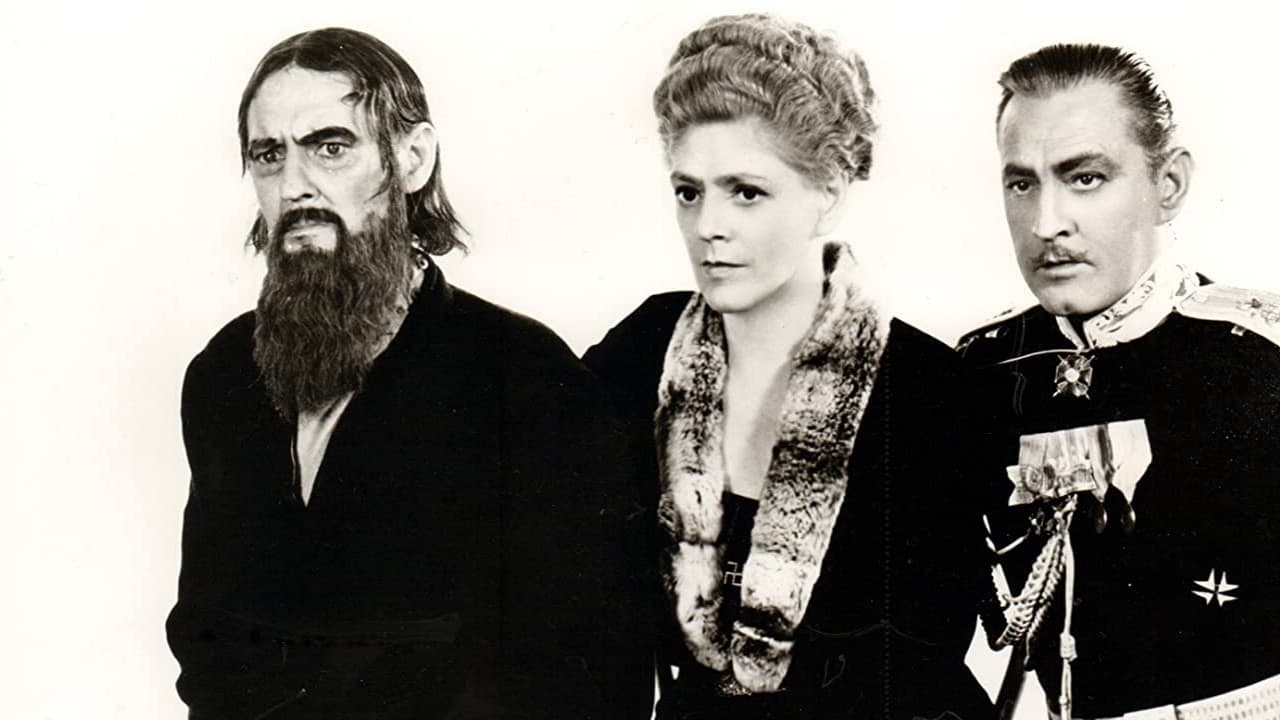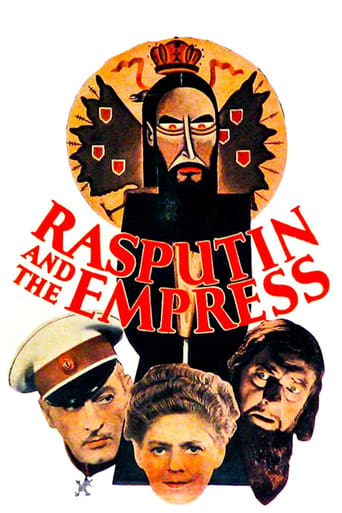Plantiana
Yawn. Poorly Filmed Snooze Fest.
Teddie Blake
The movie turns out to be a little better than the average. Starting from a romantic formula often seen in the cinema, it ends in the most predictable (and somewhat bland) way.
Keeley Coleman
The thing I enjoyed most about the film is the fact that it doesn't shy away from being a super-sized-cliche;
romanorum1
The movie commences in March 1913 amid festivities including the Russian Orthodox ritual, the tercentenary (300th anniversary) of the Romanov rule in Russia. Foreign dignitaries attend, including Archduke Francis Ferdinand of Austria-Hungary. The Archduke was destined to be assassinated by a Serbian national in June 1914, an event that would trigger World War I. The ceremony is interrupted by news of Prince Paul Chegodieff (John Barrymore) that Sergei, the czar's uncle and brother of Grand Duke Igor (C. Henry Gordon) and the father of Princess Natasha (Diana Wynyard), has been assassinated. The czar (Ralph Morgan) orders the suspects to be shot immediately without trial. Chegodieff urges moderation; he is also concerned about negative publicity.Three months later the Czarevitch Alyosha (Tad Alexander), the young son of Czar Nicholas II and a hemophiliac, suffers from a bleeding attack. His life is in danger; his vital signs are posted for public viewing. Enter Grigory Rasputin (Lionel Barrymore), not a priest but a hypnotist and mystic. As he does a better job than the court doctors and appears to heal the boy – at least the symptoms of hemophilia – he gains the favor of Czarina Alexandra (Ethel Barrymore). Because his status rises, he has influence over high appointments, even when the candidate is incompetent. Rasputin happens to enjoy the company of younger women. Paul dislikes this crude and vulgar eccentric, and refers to him as a charlatan, a "Holy Leech." Rasputin in turn develops extreme megalomania: "I will be Russia," he utters. He urges the czar to continue his mobilization and stand up to the German Kaiser and defend Serbia, even if these actions lead to war. As usual, Chegodieff urges moderation. The film is inaccurate here, as Rasputin in real life urged Nicholas not to go to war in 1914. Not only are wars ruinous in lives and property, but the peasants who are armed may not want to turn in their weapons at war's end. These points concerning the First World War are not really covered by the film. In the movie, Rasputin loses the favor of the czarina during the war, a situation that never happened as she backed him to the end. In the film Rasputin has maintained his favor with Czar Nicholas, who eventually dismisses his rival Chegodieff from his military rank. Meanwhile Nicholas has taken over personal command of the Russian armies. The final twenty-five minutes focus on the end of Rasputin (1916) and the removal of the czar the following year. The liquidation of the czar's family subsequently occurred at Ekaterinburg by the Bolshevists (1918). Although the film is fairly accurate about the monk's demise, note that Rasputin's actual death also came as a result of several gunshot wounds. The cyanide-poisoned Tobolsk cakes apparently had little effect. Unlike the film's premise, in real life Rasputin accepted the fateful invitation of his rival to attend the party on 30 December 1916. Although the movie shows the food riots and dissatisfaction of the populace (some stock footage of actual events), it fails to go into detail concerning the fate of the czar's family. Such particulars would include Russia's defeat and withdrawal from the war (1917) and the subsequent civil war fighting between the Reds and Whites. There is another inaccuracy, specifically when the movie earlier implies that the Duma (legislative assembly) was being formed in 1913. Actually the Duma was formed in 1906, following the disastrous defeat of the Russians in the Russo-Japanese War and the Russian revolution of 1905. On the other hand, it is certainly true that people could purchase Rasputin's favor and gain appointments to high office without regard to their qualifications. In the beginning film credits, the cast listing claims that Chegodieff, Natasha, Grand Duke Igor, and Doctor Remezov are fictional characters, but historians will recognize Chegodieff as Prince Feliks Yusupov (one of Rasputin's assassins), Natasha as Princess Irina (Yusupov's wife), and Grand Duke Igor as Grand Duke Nicholas (not the same man as the czar). In real life Prince Feliks Yusupov took offense and in 1934 brought a libel lawsuit against MGM, the film's producers. He won his case. "Rasputin and the Empress" is the only film that features together the three Barrymores: Lionel, Ethyl, and John. They do well enough; that is, in 1930s acting mode. Lionel, although a decade older than Rasputin when the mystic flourished, captures the coarseness of the infamous and enigmatic character, and his impact in Russia's royal court. John's portrayal of the assassin Chegodieff is sympathetic as one who earnestly wants to save Russia from the unpopular eccentric. As for Ethyl, this was her inroad into talkies. Ralph Morgan adequately conveys Czar Nicholas' lack of resolution and astuteness. The costumes and sets are of high quality; the plot is easily followed and maintains interest.
calvinnme
...forget about it. This film is completely inaccurate in its portrayal of actual events in Russian history. As for the nature and character of the historical figures involved, the three Barrymores give good renditions. There is Ethel Barrymore looking every inch the empress and giving a convincing portrayal of a woman concerned for the welfare of her very ill son - and I would expect that. What I didn't expect is how weird it would be to watch a film in which John Barrymore is the shining hero and Lionel Barrymore is a truly diabolical villain, and each are spectacularly convincing in their portrayals. Lionel is really the center of attention here as he plays the evil Rasputin whose ability to sidestep assassination attempts is legendary, and here a few logical explanations are given to some of his alleged abilities. However, none can explain what happened at the end of his life - how he was poisoned, bludgeoned, shot, and finally thrown into an icy river and still managed to cling to life for awhile.Although Tsar Nicholas is accurately portrayed as a rather weak willed man and the Romanov marriage is also accurately portrayed as one of the few royal arranged marriages that also turned out to be a love match, there is a mischaracterization of the Tsar as being progressive and wanting a Duma only to have Rasputin defeat that plan. In fact, Nicholas was autocratic in his outlook and distrusted any attempt to give the people more say in their government. This sets up one of the great ironic struggles in the film - that of aristocrat Prince Paul Chegodieff (John Barrymore) wanting more for the peasants in the way of both bread and democracy, and that of peasant mystic Rasputin (Lionel Barrymore) saying that it was God's will that the peasants were poor and powerless. Paul wants to save Russia, Rasputin wants to rule it.Another piece of fiction shown in the movie for dramatic measure are the public proclamations about the illness of Tsaravich Alexai, the heir to the Russian throne. In fact one of the things that turned the Russian people against the royal family - besides the fact that they were starving during WWI - was that the people assumed that Rasputin's hold over the empress was because they were lovers. The Romanovs did not want it to be known that the only son in the family and heir to the throne had a serious disease - in this case hemophilia - that kept him in very delicate health and would likely lead to a greatly shortened lifespan. They felt it would leave them vulnerable to the overthrowing of their rule. Ironically hiding the truth and leaving Rasputin's relationship to the empress unexplained also led to exactly that.Watch this one for the high production values and compelling performances by the members of Hollywood's royal family during its golden age, but as for a Russian history lesson, look elsewhere.
David_Brown
This movie is important because of course, it is the only one that had all three Barrymores. But it is really Johm's Film. Every scene he is in he steals. Spoiler: In particular the scene where the young Czarevitch bites him, and the final fight against Rasputin. What is amazing is everyone else in this film is either naive or totally evil. John's Paul Chegodieff is the only one who is neither. I have never seen a Barrymore silent film (When everyone says he was at his best), but I have seen most of his talkies, and he is always good. Lionel's Rasputin is way over the top and Ethel, even though it was supposed to be history, essentially plays the same kind of character we saw in "Kind Lady", and the "Portrait of Jenny". I give it 5 out of 10 stars, mostly for John.
Pat-54
The only film that all three Barrymores appeared in together. Rather dated and sometimes laughable, especially Ethel's constant "double-takes" whenever a dramatic moment occurs. But it's still worth watching.

